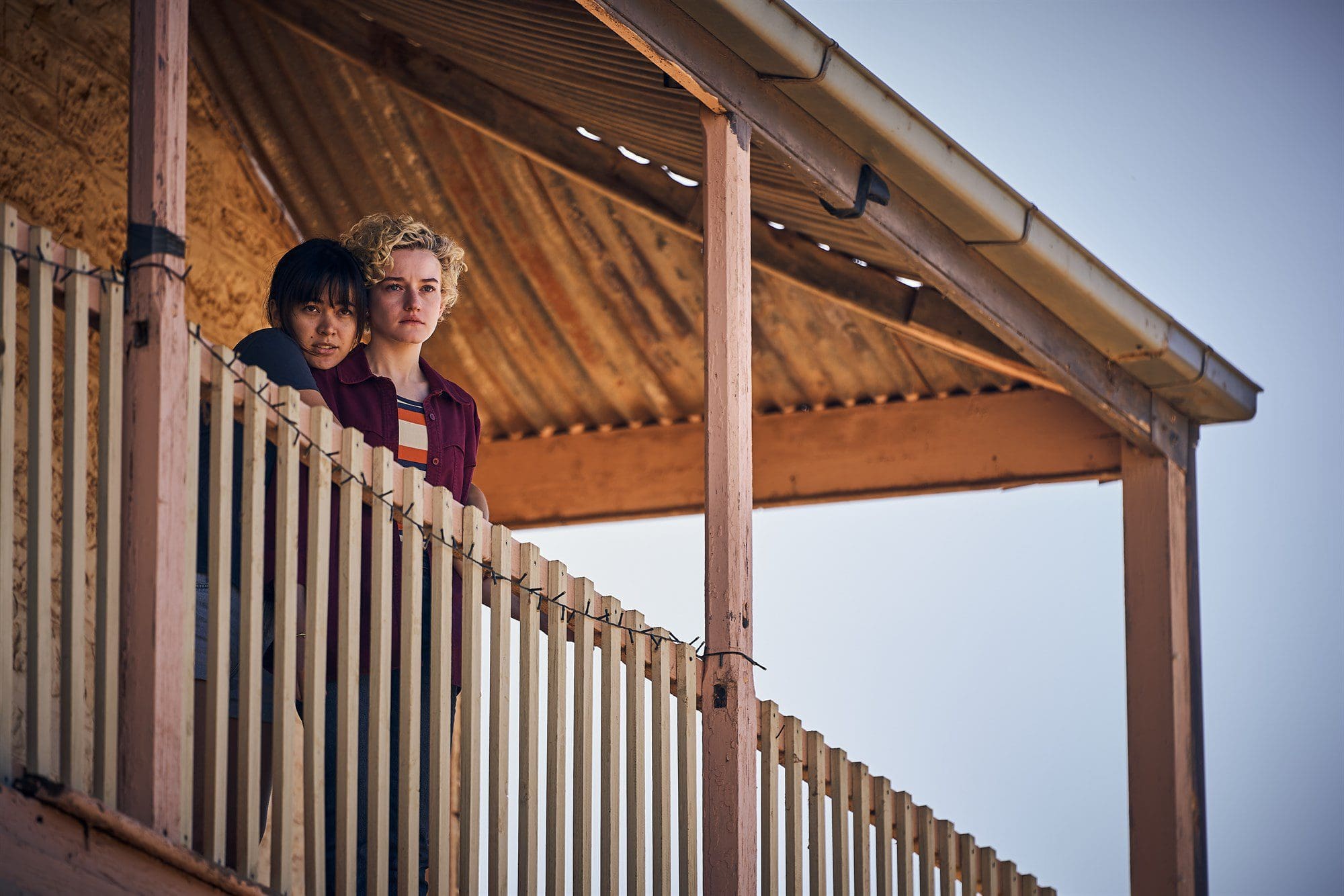
In the opening scenes of director Kitty Green’s new film, The Royal Hotel, American tourists, Hanna (Julia Garner) and Liv (Jessica Henwick), appear to be in a club late at night. While Hanna dances happily, basking in male attention, Liv feels slightly out of place, humiliated when she tries to flirt with the bartender only to have him barely acknowledge her. Immediately, the scene sets not just the dynamic between the two friends, but how they relate to the world—particularly when it comes to dating and men. Yet the scene is not all it appears.
After her humbling interaction with the bartender (in which Liv realizes she’s completely out of cash) she goes to find Hanna and reveals that this crowded, pulsing club isn’t in some Australian warehouse, but inside a large boat cruising Sydney Harbour in the middle of the day. It’s a jarring shift in perspective. But it’s not only integral to the ideas Green and co-writer Oscar Redding explore, it also sets a precedent for just how often The Royal Hotel will disorient—and discomfort—viewers before the credits roll.
After Liv tells Hanna about her dire financial situation, the pair decide to, rather than go home (a prospect they speak of with pointed looks filled with unexplained meaning), take a temporary work position at an isolated bar in the Outback called The Royal Hotel. And they quickly realize that the world they’ve entered is very different from the one they left. While the bar’s owner, Billy (Hugo Weaving), initially seems like a belligerent if harmless drunk, he shocks both the girls and the audience when he calls Hanna a, “smart cunt.” Granted, that word has a different cultural context in Australia than America, but it’s clear from the look on Billy’s face that he intends to hurt. The moment is just the first in which Liv and Hanna glimpse the culture of misogyny that surrounds the bar.
Indeed, the longer they’re there, the more dangerous the bar’s nearly all-male patrons seem. Whether it’s the older woman who joins in with the sexual jokes the boys make at the girls’ expense—making it clear that that they have no allies—or the night when Hanna is startled to find Dolly (Daniel Henshall) drunkenly and somewhat menacingly standing in the hallway outside the room above the bar where the girls sleep, it seems inevitable that one of the men will eventually take things too far.
And yet, each time Liv and Hanna seem destined for catastrophe, the unexpected occurs. When Matty (Toby Wallace) drives the girls hours away from the bar on their day off with the promise to take them swimming, they don’t end up dead in a ditch in the middle of the desert, but at a genuine oasis. Later, when Matty and Hanna are making out, Matty actually backs off when Hanna says she doesn’t want to go further. Admittedly, it takes him a few moments of convincing, but his eventual acquiescence runs counter to what we expect both on film and in real life. Still, the film’s tension eventually comes to a breaking point and it’s there that it runs into trouble.
Part of what gave Green and Garner’s previous collaboration, 2019’s The Assistant, such power was its essential nihilism. It acknowledged and subtly condemned how misogyny and situations that sexually exploit women are perpetuated by a mix of tacit acceptance, fear, inaction or even outright villainy. Similarly, Liv and Hanna seem like they’re on an inescapable road to disaster for much of The Royal Hotel. Indeed, the disaster eventually comes, but it’s not necessarily what all the tension and dread leads us to expect. It’s hard to dissect the ending without spoiling it, but Green keeps viewers in a place of paralyzed dread for so long that once the action accelerates, the turns can feel too abrupt, or worse, unearned. Particularly with Liv, her choices in the last act feel driven by what the plot needs and how she functions in relation to Hanna rather than how we expect the character to behave based on what we’ve seen.
Like the daytime booze cruise where we meet Hanna and Liv at The Royal Hotel’s beginning, the bar itself is its own world, so self-contained and governed by its own set of rules that it distorts the girls’ and the audience’s understanding of normal. There, the spell is broken by the warmth and brightness of day, true and undeniable. However, their escape from the Royal Hotel is not so pure. Where The Assistant tapped into profound truth by examining how women are dehumanized by trying to survive a misogynistic microcosm with brutal bleakness, The Royal Hotel goes for something more empowering—and yet it feels false. While some viewers will undoubtedly feel a righteous thrill through the film’s ending, the final beats are so rushed that the triumph feels hollow.

